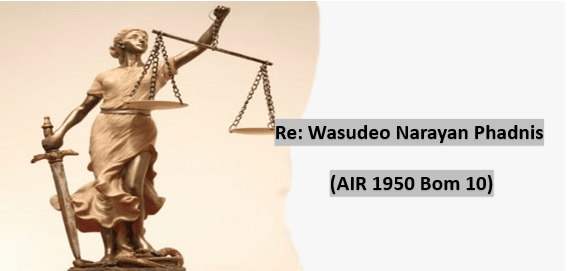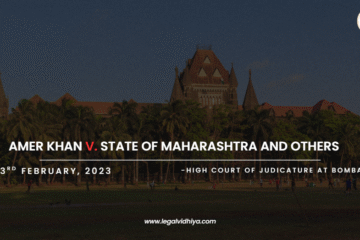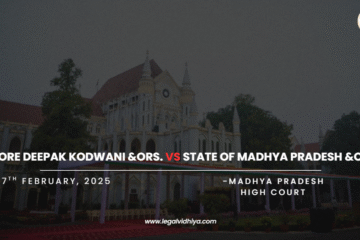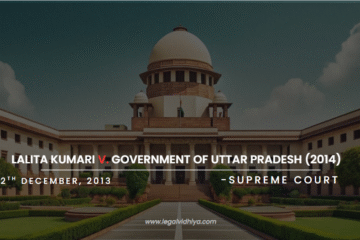
Re: Wasudeo Narayan Phadnis (AIR 1950 Bom 10)
Introduction:
The case of In Re: Wasudeo Narayan Phadnis is a landmark judgment delivered by the Bombay High Court in 1950. It dealt with the interpretation of Article 311(2) of the Constitution of India, which provides protection to government servants against arbitrary dismissal or removal from service.
Facts of the Case:
Wasudeo Narayan Phadnis, the petitioner, was a Deputy Superintendent of Police employed by the government. He was dismissed from service without being provided with an opportunity for a formal inquiry. The petitioner challenged the dismissal, contending that it violated his constitutional rights.
Petitioner’s Contentions:
- Violation of Article 311(2): The petitioner contended that his dismissal from service without being provided with an opportunity for a formal inquiry violated the protection guaranteed under Article 311(2) of the Constitution. He argued that the language of the article clearly states that no government servant can be dismissed, removed, or reduced in rank except after an inquiry in which he has been informed of the charges against him and given a reasonable opportunity to defend himself.
- Mandatory Nature of Protection: The petitioner argued that the protection under Article 311(2) is mandatory and cannot be arbitrarily denied to government servants. He emphasized that the requirement of an inquiry and a reasonable opportunity to defend oneself are essential safeguards to prevent unfair and arbitrary dismissals.
- Scope of “Dismissal”: The petitioner contended that the term “dismissal” mentioned in Article 311(2) includes both removal from service as well as termination of service. He argued that any action resulting in the termination of his employment, regardless of the label given to it, should be considered as “dismissal” for the purposes of the article.
Respondent’s Contentions:
- No Violation of Article 311(2): The respondent, representing the government, argued that there was no violation of Article 311(2) in the petitioner’s dismissal. They contended that the petitioner’s services were terminated in accordance with the relevant rules and regulations governing government employees.
- Exclusion of Protection: The respondent claimed that the protection under Article 311(2) can be limited or excluded by express provisions in the statute or the terms of employment. They argued that the specific rules governing the petitioner’s employment allowed for termination without a formal inquiry under certain circumstances.
- Proper Procedure Followed: The respondent contended that the petitioner was given an opportunity to present his case and was heard before the decision to terminate his services was made. They argued that the petitioner’s dismissal was a result of his unsatisfactory conduct and performance, justifying the action taken.
- It’s important to note that the specific arguments presented by the parties may not be fully captured in the available information.
Key Issues:
- Whether the petitioner was entitled to the protection under Article 311(2) of the Constitution.
- Whether the dismissal of the petitioner without a formal inquiry was justified.
Court’s Analysis and Observations:
The Bombay High Court, in its analysis, focused on the interpretation and scope of Article 311(2) of the Constitution, which states that no government servant can be dismissed, removed, or reduced in rank except after an inquiry in which he has been informed of the charges against him and given a reasonable opportunity to defend himself.
The court observed that the language of Article 311(2) clearly indicates that the protection provided therein is mandatory. It emphasized that the requirement of an inquiry and a reasonable opportunity to defend oneself are essential safeguards to prevent arbitrary and unfair dismissal of government servants.
The court also highlighted that the protection under Article 311(2) is not absolute and can be limited or excluded by express provisions in the statute or the terms of employment. However, in the present case, no such exception or exclusion was found to apply.
Furthermore, the court examined the meaning of “dismissal” and held that it includes both removal from service as well as termination of service. It clarified that any action resulting in the termination of the petitioner’s employment, even if labeled differently, would fall within the ambit of “dismissal” for the purposes of Article 311(2).
Court’s Decision:
The Bombay High Court, after analyzing the facts and legal provisions, concluded that the dismissal of the petitioner without a formal inquiry violated the protection guaranteed under Article 311(2) of the Constitution. The court held that the petitioner was entitled to a reasonable opportunity to defend himself and ordered his reinstatement with full back wages.
Significance of the Case:
The case of In Re: Wasudeo Narayan Phadnis played a pivotal role in clarifying the scope and interpretation of Article 311(2) of the Constitution. It emphasized the mandatory nature of the protection provided to government servants and the importance of conducting a fair inquiry before imposing any disciplinary action. The judgment reaffirmed the principle of natural justice and acted as a safeguard against arbitrary dismissal of government employees.
Conclusion:
The case of In Re: Wasudeo Narayan Phadnis serves as a significant precedent in Indian constitutional law, specifically in the field of administrative and employment law. It reiterates the constitutional safeguards for government servants and reinforces the principle of due process and fairness in disciplinary proceedings. The judgment ensures that public servants are protected from arbitrary and unjustifiable dismissals and upholds the values of justice and procedural fairness in public administration.
written by Abhinav bhardwaj intern under legal vidhiya.




0 Comments